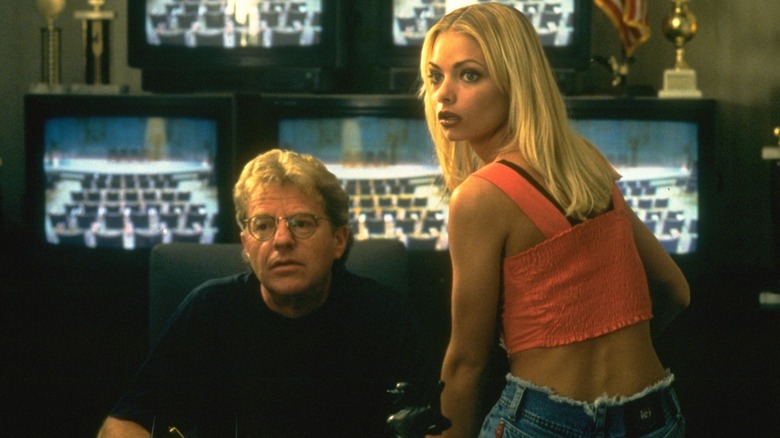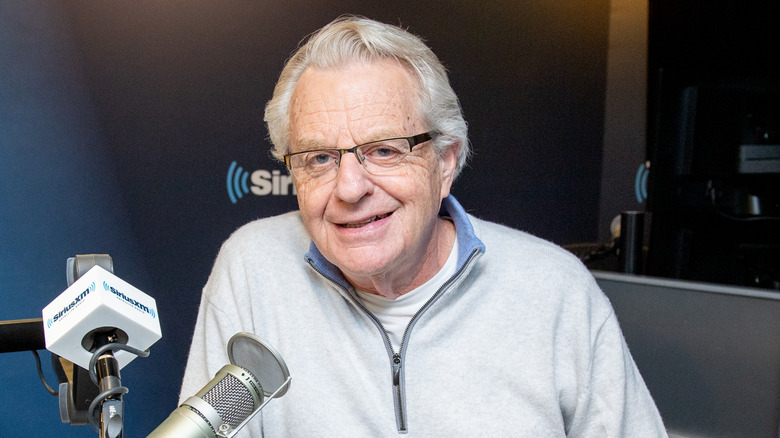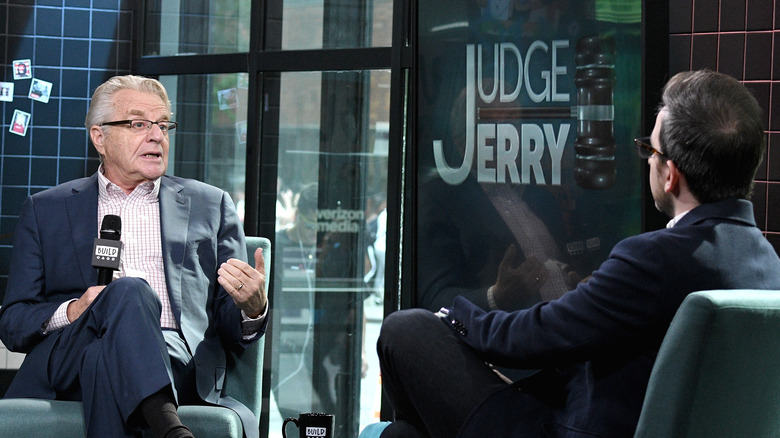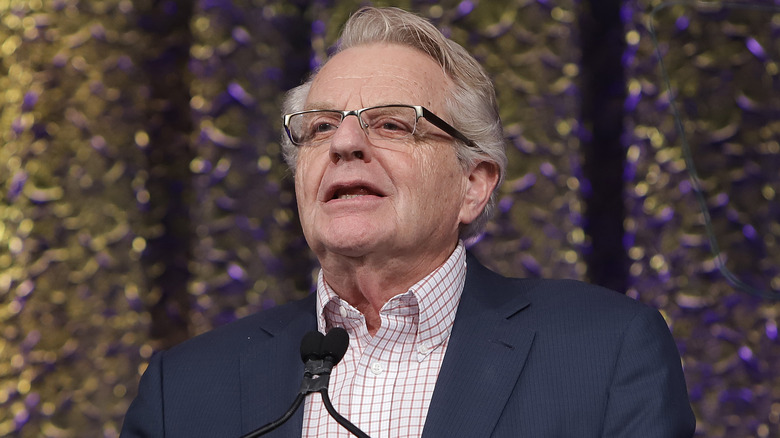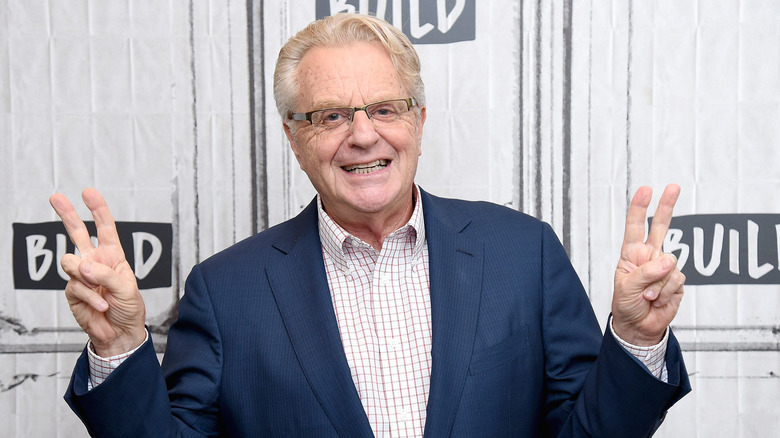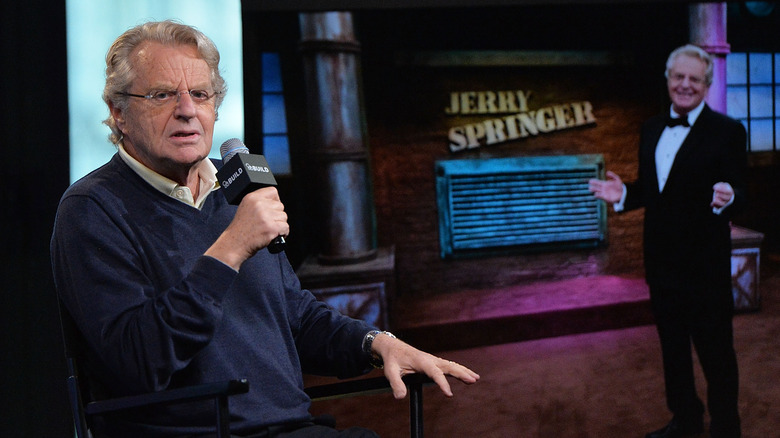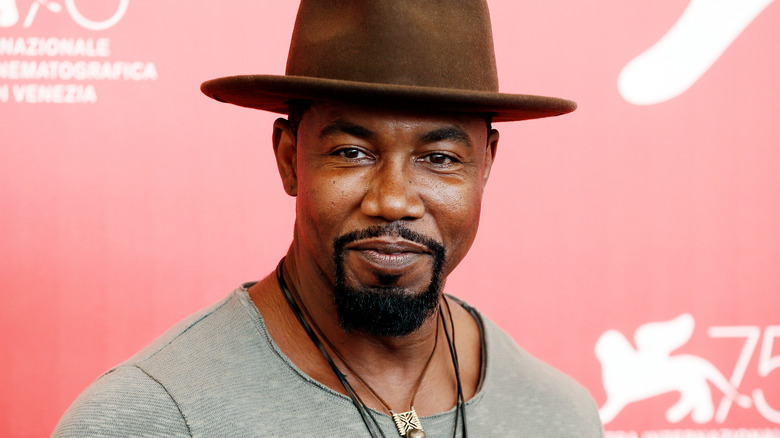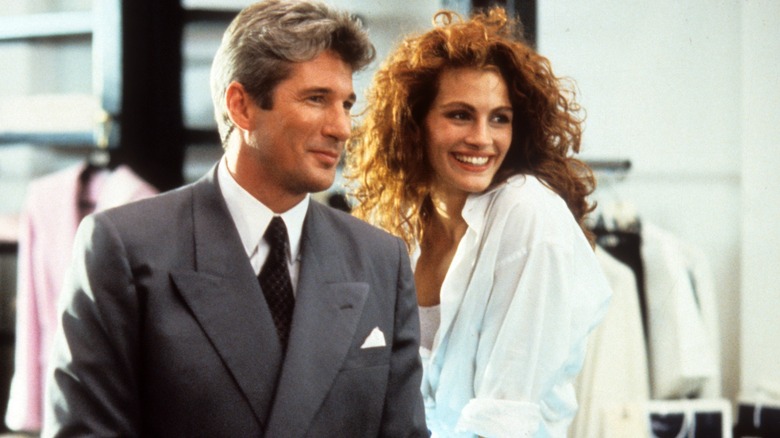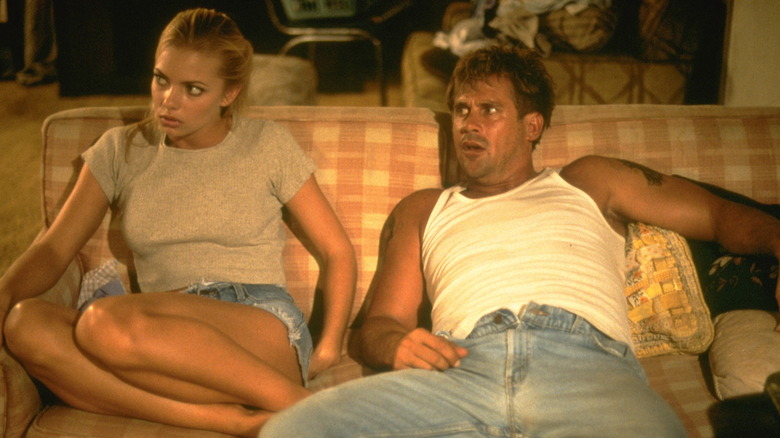The Complete History Behind Jerry Springer's Ringmaster
With the recent passing of television icon Jerry Springer, it's about time we all look back on his short but notable filmography to see what legacy he'll leave behind on the big screen. Fans of Springer will best remember him as a uniquely fascinating television personality, broadcaster, and producer who spent over 30 years in the entertainment industry as the host of "The Jerry Springer Show" and "Judge Jerry."
Springer became known for the bombastic approach to his talk show where guests would often get into verbal, and sometimes physical, conflict with one another in front of a live studio audience. While some in mainstream media looked down on the more trashy elements of Springer's work such as David Sedaris, who described him as the "new Satan" in a 1998 piece for The New York Times, others saw the comedic potential for someone of his talents.
Against all odds and reason, Springer made the pivot from TV to the big screen with the creation of 1998's "Ringmaster," directed by Neil Abramson and starring Springer as a thinly-veiled self-insert named Jerry Farrelly. While this film has mostly been forgotten to time by the average movie buff, it's received renewed attention since the news of Springer's unfortunate passing from pancreatic cancer at the age of 79. So, read on to discover the complete history behind "Ringmaster."
Jerry Springer's first and only time starring in a movie
While Springer was undeniably a talented and once-in-a-lifetime broadcaster, he wasn't known for being much of a professional actor. That's why it's probably pretty unsurprising to learn that "Ringmaster" was one of the few theatrical performances of Springer's career, aside from small cameos as he dotted across his many years in the entertainment industry.
"Ringmaster" was the first and only time in Springer's career that he secured a leading role as the main character of an entire movie, which was themed heavily around his own life as a talk show host. Aside from that, Springer did land many small roles in various shows and movies over the years including appearances in "Married... With Children," "The Defender," "The X-Files," and a cameo as himself in 1999's "Austin Powers: The Spy Who Shagged Me." Overall, Springer's role in "Ringmaster" is one of the most substantial acting performances of his entire career.
Went with a made-up name instead of The Jerry Springer Show
In "Ringmaster," Springer plays the role of a broadcaster named Jerry Farrelly who hosts a familiar feeling trashy talk show simply called "Jerry." This clearly is pretty close to home in terms of the movie's content, but audiences at the time were probably left wondering why the movie didn't just outright call the in-universe show by the same name as Springer's real-life show. Well, the reason is because of legal issues regarding the show's name.
For over 26 years, "The Jerry Springer Show" was both produced and aired by NBCUniversal and CW while also being in syndication. While the show was allowed to be broadcast across many different television networks over the years, it turns out that the producers were still protective of the show's brand enough to prevent it from being used outside their domain. That's why when "Ringmaster" was produced by the Motion Picture Corporation of America, The Kushner-Locke Company, and distributed by Artisan Entertainment, they opted to just go with an obvious analog name with the "Jerry" show.
Used the same title as his autobiography released the same year
For a show about a sleazy talk show host who has to orchestrate the complex, absurd, and often violent interactions of his guests, the name "Ringmaster" seems like an apt title for a movie about that very same topic. While Springer is known for being a creative entertainer throughout his long career, it seems as though that creativity ends when it comes to naming things since he ended up using the exact same name for both his autobiography and "Ringmaster" the film.
In 1998, "Ringmaster" was released into theaters but in the same year Springer published his autobiographical work, also titled "Ringmaster." During a contemporary interview with CNN, Springer touched on this connection by explaining his decision-making in a hilariously unashamed way. "Well, I can only think of one title a year. So 'Ringmaster' was what I — the book is autobiographical," he explained. "The book is about me and the show, how I got to have the show, the crazy stuff that goes on with it. So the book is, as I said, autobiographical."
Springer went on to explain how the movie differentiates itself from the real-life stories told in his book since "Ringmaster" is more of a farcical flick. He added, "The movie is just a comedy. It's a comedy about these two dysfunctional families that are desperately trying to get on this crazy talk show, and I happen to be the host for the talk show."
Springer won a Golden Raspberry for his performance
Springer held a unique place in popular culture, riding the line between being an entertaining television persona to being a controversial tabloid figure who gained a reputation for creating the era of "trash TV" that would go on to include the likes of "Maury" and "Dr. Phil," to name a few. Springer had earned legitimate praise over the years thanks to his special place on mainstream television, with many publications remembering him fondly as a staple of popular culture and even "millennials' babysitter" according to the Los Angeles Times.
Nonetheless, Springer's leading performance in "Ringmaster" was not highly regarded upon release by audiences or critics alike. This was encapsulated by his nomination for a "Golden Raspberry for worst new star" award in 1998 at the annual event lampooning that year's most mediocre to outright bad films. Springer ended up tying with Joe Eszterhas for his performance in the mockumentary film, "An Alan Smithee Film: Burn Hollywood Burn." Ultimately, Springer is in good company with other lifetime winners of this particular Golden Raspberry such as Sofia Coppola for "The Godfather Part III," Lou Ferrigno in "Hercules," and Pamela Anderson in "Barb Wire."
Had a popular soundtrack with one track even hitting Billboard top 100
Despite being a mostly forgotten and outright disliked piece of cinema, "Ringmaster" did find some success in the music scene thanks to its surprisingly hit soundtrack. The official name for the album, "Music from and Inspired by Jerry Springer's Movie Ringmaster," actually featured 15 songs by various artists including 2Pac, Freak Nasty, Ice-T, and Luke.
Shockingly, this soundtrack managed to have two songs chart on Billboard upon release. One track that was released in 1999 by Lil' Joe Records ended up peaking at #80 on the top R&B/hip-hop albums of that year, but the more impressive stat is where the single, "Talk Show Shh!," by Shae Jones landed. Jones' song actually peaked at #88 on that year's Billboard top 100, which is pretty impressive for a piece of music created for a Jerry Springer movie. Ironically, despite making a music video specifically for the song to promote "Ringmaster," it did not end up being on the film's official soundtrack album.
Featured an unexpected Michael Jai White appearance
The tagline for "Ringmaster" that can be seen on its poster simply reads, "America's #1 Action Hero!," in front of a picture of Springer's face. While this is meant to be humorous, it is in some ways backed up by the unexpected appearance of an actual action hero through Michael Jai White's performance as Demond.
For the most part, the cast of "Ringmaster" is small and unknown with only a few performers having any mainstream notoriety such as Jaime Pressly and Wendy Raquel Robinson. The major exception to this is White, who is best known for his work portraying the first African American superhero in 1997's "Spawn." White is also renowned for his skills as a martial artist since he has trained in nine different styles such as Taekwondo and Jujutsu.
Some of his other major acting roles include appearances in "Why Did I Get Married?," "Mortal Kombat: Legacy," "Tyson," and "Black Dynamite." His small part in "Ringmaster" is a surprising welcome to see someone with significant acting and martial arts talent appear in a movie filled with physical conflict.
Produced by the same guy who made Pretty Woman
Movies aren't made overnight and often require a massive team behind them to make the magic happen. Even something as obscure as "Ringmaster" required a significant amount of manpower and funding to create since, after all, the film had a budget of roughly $20 million dollars. That's where someone like producer Gary W. Goldstein comes in.
Springer and Goldstein partnered up for the creation of "Ringmaster," with Goldstein being the primary and sole producer of the film. Film buffs may recognize his name from some of his other notable production efforts, such as 1990's "Pretty Woman" starring Julia Roberts, and 1992's "Under Siege" with Steven Seagal. While Goldsmith had an impressive production history towards the beginning of his career, things seemed to cool down following the release of "Ringmaster" as his only other major producing credit since then came in the form of 2002's "The Mothman Prophecies."
Tanked at the box office by only making back half its budget
As previously mentioned, "Ringmaster" managed to secure a sizable budget of roughly $20 million for a seemingly throwaway comedy picture. Similar comedy films released the same year include "Half Baked" with a budget of $8 million, and "The Wedding Singer" with a budget of $18 million, which by comparison makes "Ringmaster" seem surprisingly high considering its content.
Nonetheless, "Ringmaster" proved to be a failure both critically and commercially upon release. The film was lambasted by critics for being both tasteless and unfunny, holding only a 21% on Rotten Tomatoes score s of this writing. It also flopped at the box office by making less than half of its budget back with roughly $9 million in returns. Thus, the story of "Ringmaster" is ultimately one of not being able to capitalize on the success of Springer's undeniably entertaining television show which continued on well after this cinematic experiment flopped.
